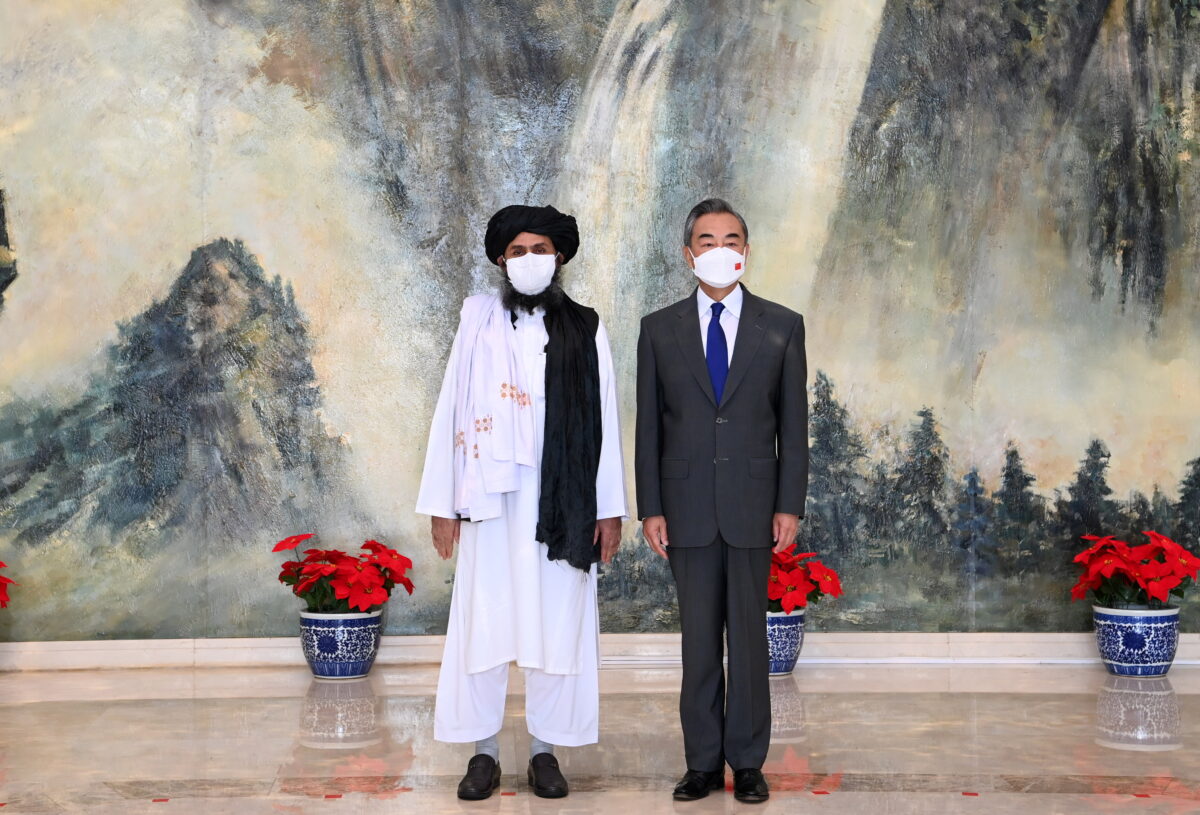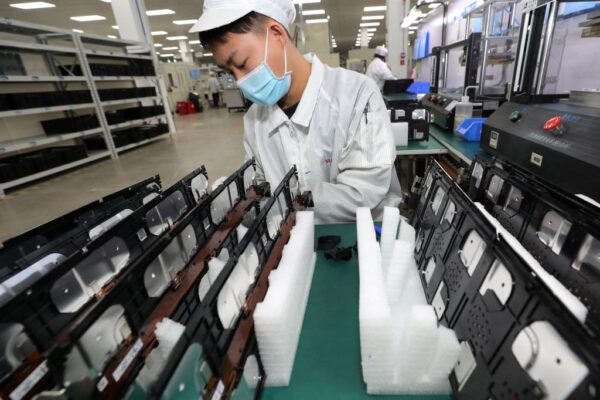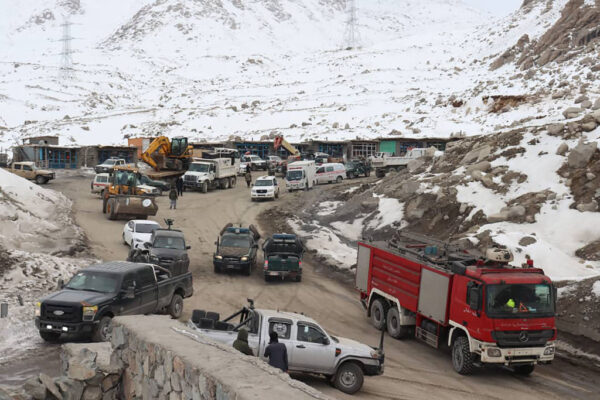IN-DEPTH: The Real Reason Behind China’s $10 Billion Offer to Taliban for Lithium
A Chinese company has offered the Taliban $10 billion and a proposal to build key strategic infrastructure connecting north-south Afghanistan in exchange for access to the country’s lithium reserves. Some experts raised concerns that the offer would allow the Chinese regime to expand its influence in the region. The proposal was discussed between a representative of Gochin and the acting minister of the Taliban’s Ministry of Mines and Petroleum, Sheikh Hadith Shahabuddin Delawar, in his office on April 13. The talks happened just a few months after the Taliban arrested two Chinese nationals trying to smuggle 1,000 metric tons of lithium-bearing rocks out of the country. Experts said it needs to be seen if the deal is feasible, but once signed, it will have diplomatic and political ramifications, and the proposed infrastructure development will likely have a long-term strategic impact. “Geopolitically, this deal could give China a significant advantage and influence in the region, as it secures a supply of critical resources and strengthens its presence in Afghanistan,” Maher Saadat, an exiled activist and Afghan affairs analyst, told The Epoch Times in an email. Afghanistan’s lithium reserves potentially rival those of Bolivia, which has the world’s most significant amount of lithium resources. The Taliban’s Ministry of Mines and Petroleum said in a press release that the deal, once executed, will provide direct employment to 120,000 people and indirectly to 1 million. Abhishek Darbey, a research associate of the Chinese Research Program at the New Delhi-based Center for China Analysis and Strategy (CCAS), pointed out to The Epoch Times in an email that China is among the first countries that supported the Taliban to form a government in Kabul following the withdrawal of the United States from the country. He believes the Chinese regime wants to control the region. “In the case of Afghanistan, the country is important for China because the land domain of the Belt and Road Initiative will pass through this region, and a peaceful Afghanistan will create favorable conditions for the BRI to grow and progress,” he said. “Also, China considers itself to be a major power of the region and, therefore, it wants to be a participant in [the] decision-making of the region or wants to be a power with a capacity to influence the regional politics,” he added. Chinese Foreign Minister Wang Yi meets with Mullah Abdul Ghani Baradar, political chief of Afghanistan’s Taliban, in Tianjin, China, on July 28, 2021. (Li Ran/Xinhua via Reuters) Lithium for the Taliban Afghanistan’s lithium reserves are a quick source of money for the Taliban, but they don’t have a long-term strategic goal for it, according to the experts. “They may view it as an opportunity to generate immediate revenue to fund their activities and consolidate their power, given their history of relying on various sources of illicit financings, such as drug trafficking and extortion,” Saadat said. The Taliban’s focus on immediate financial gains—without considering the long-term implications and sustainable development of the lithium deposits—is likely to limit the potential benefits of the reserves for Afghanistan and its people, she said. “[It] will not contribute to the overall socio-economic development and stability of the country with certainty,” she said. The first lithium mine was discovered in Ghazni city in 2013. These rare mineral mines are located in five areas in Afghanistan: Herat, Shuryak Valley, Tagab District in Kapisa Province, Nawur District in Ghazni Province, and Badakhshan. Darbey said the Chinese interest in the region is not new—in 2021, two Chinese companies were sent to Ghazni to conduct technical research and inspect lithium and goldmines. While China’s lithium reserves are depleting, the Afghan deposits are unexploited. Five Chinese companies have set up their representative offices in Afghanistan, and around 20 Chinese companies have made inquiries about lithium projects, according to Darbey. Delawar said that the contract of the mines in Afghanistan would be given according to the Taliban’s law. Darbey pointed out that the Taliban government is already supporting Chinese investment in its wider mining sector, and China’s two largest lithium miners—Tianqi and Ganfeng—have already examined the lithium mines in Afghanistan. A factory worker at Xinwangda Electric Vehicle Battery Co. Ltd, which makes lithium batteries for electric cars and other uses, in Nanjing in China’s eastern Jiangsu Province, on March 12, 2021. (STR/AFP via Getty Images) Infrastructure Development The Taliban’s Ministry of Mines and Petroleum said in its press release that the Chinese had proposed developing three infrastructure projects: the Salang Tunnel that connects north Afghanistan with Kabul, the Nuristan highway that connects Kunar to Laghman, and a power dam project. “The Chinese side has said that they will repair Salang Pass for smoo

A Chinese company has offered the Taliban $10 billion and a proposal to build key strategic infrastructure connecting north-south Afghanistan in exchange for access to the country’s lithium reserves. Some experts raised concerns that the offer would allow the Chinese regime to expand its influence in the region.
The proposal was discussed between a representative of Gochin and the acting minister of the Taliban’s Ministry of Mines and Petroleum, Sheikh Hadith Shahabuddin Delawar, in his office on April 13. The talks happened just a few months after the Taliban arrested two Chinese nationals trying to smuggle 1,000 metric tons of lithium-bearing rocks out of the country.
Experts said it needs to be seen if the deal is feasible, but once signed, it will have diplomatic and political ramifications, and the proposed infrastructure development will likely have a long-term strategic impact.
“Geopolitically, this deal could give China a significant advantage and influence in the region, as it secures a supply of critical resources and strengthens its presence in Afghanistan,” Maher Saadat, an exiled activist and Afghan affairs analyst, told The Epoch Times in an email.
Afghanistan’s lithium reserves potentially rival those of Bolivia, which has the world’s most significant amount of lithium resources. The Taliban’s Ministry of Mines and Petroleum said in a press release that the deal, once executed, will provide direct employment to 120,000 people and indirectly to 1 million.
Abhishek Darbey, a research associate of the Chinese Research Program at the New Delhi-based Center for China Analysis and Strategy (CCAS), pointed out to The Epoch Times in an email that China is among the first countries that supported the Taliban to form a government in Kabul following the withdrawal of the United States from the country. He believes the Chinese regime wants to control the region.
“In the case of Afghanistan, the country is important for China because the land domain of the Belt and Road Initiative will pass through this region, and a peaceful Afghanistan will create favorable conditions for the BRI to grow and progress,” he said.
“Also, China considers itself to be a major power of the region and, therefore, it wants to be a participant in [the] decision-making of the region or wants to be a power with a capacity to influence the regional politics,” he added.

Lithium for the Taliban
Afghanistan’s lithium reserves are a quick source of money for the Taliban, but they don’t have a long-term strategic goal for it, according to the experts.
“They may view it as an opportunity to generate immediate revenue to fund their activities and consolidate their power, given their history of relying on various sources of illicit financings, such as drug trafficking and extortion,” Saadat said.
The Taliban’s focus on immediate financial gains—without considering the long-term implications and sustainable development of the lithium deposits—is likely to limit the potential benefits of the reserves for Afghanistan and its people, she said.
“[It] will not contribute to the overall socio-economic development and stability of the country with certainty,” she said.
The first lithium mine was discovered in Ghazni city in 2013. These rare mineral mines are located in five areas in Afghanistan: Herat, Shuryak Valley, Tagab District in Kapisa Province, Nawur District in Ghazni Province, and Badakhshan.
Darbey said the Chinese interest in the region is not new—in 2021, two Chinese companies were sent to Ghazni to conduct technical research and inspect lithium and goldmines.
While China’s lithium reserves are depleting, the Afghan deposits are unexploited. Five Chinese companies have set up their representative offices in Afghanistan, and around 20 Chinese companies have made inquiries about lithium projects, according to Darbey.
Delawar said that the contract of the mines in Afghanistan would be given according to the Taliban’s law.
Darbey pointed out that the Taliban government is already supporting Chinese investment in its wider mining sector, and China’s two largest lithium miners—Tianqi and Ganfeng—have already examined the lithium mines in Afghanistan.

Infrastructure Development
The Taliban’s Ministry of Mines and Petroleum said in its press release that the Chinese had proposed developing three infrastructure projects: the Salang Tunnel that connects north Afghanistan with Kabul, the Nuristan highway that connects Kunar to Laghman, and a power dam project.
“The Chinese side has said that they will repair Salang Pass for smooth transportation between China and Afghanistan for the purpose of mining and other activities,” Darbey said.
Gochin has proposed to repair the Salang Pass—a lifeline of Afghanistan—in seven months and carve another tunnel over the pass.
The fight for Salang Pass has been an important part of Afghanistan’s war history because of its strategic location on the map—the Soviet Union and the United States used it to move military troops. Today the pass is important for the Taliban’s military movement.
The first construction for the two-lane Salang highway across the Hindukush mountains, which included creating a 1.7-mile-long tunnel at the Salang Pass at 3,400 meters above sea level, was undertaken by the Soviets in the 1960s.
The narrowness of the Salang Pass is one of the factors responsible for the chaotic U.S. withdrawal from the country, according to Saadat, who said that the U.S. military heavily relied on airlifting supplies because it was difficult to move heavy equipment through the pass.
“This airlifting was not only logistically challenging but also economically expensive, which added to the overall cost of the U.S. military presence in Afghanistan,” she said, adding that the high cost of the war in Afghanistan was one of the main reasons the United States left the country.
Today the Taliban controls the crucial transportation route for moving fighters and supplies across the country because they have complete control over the Salang Tunnel, making it indispensable for the Taliban’s military operations, according to Saadat.
“Additionally, the Nuristan Highway and Power Dam provide the Taliban with an opportunity to control the region’s infrastructure, which can be used to exert power and influence over the local population,” she said.
The Taliban had last year announced that tariffs on freight traffic would generate $341 million in its treasury. Saadat said that the Chinese-proposed projects could also generate revenue through taxation and extortion, which can be used to fund Taliban activities and consolidate its power.
Darbey said that with more Chinese infrastructure projects, it’s likely that the Chinese will train Taliban troops to improve their security apparatus in a short amount of time.
“The possibility of sending Chinese security troops in the region also cannot be undermined,” he said.
The overall situation could also create tensions with other countries that have interests in the region, potentially leading to conflicts or strained international relations, according to Saadat.
“Furthermore, it could lead to China creating a debt trap for the Taliban, increasing its economic leverage in Afghanistan and potentially affecting the geopolitical dynamics in the region,” she said.

Connection With Central Asia
Experts said the proposed infrastructure development would help improve Afghanistan’s connectivity with Central Asia, benefiting China.
Saadat said that by offering to repair the Salang Pass in seven months, China is offering the Taliban a crucial transportation route that connects Kabul to the Central Asian market through Hairatan.
Hairatan is a town in the northern Balkh Province of Afghanistan and borders Uzbekistan. It was through the same borders that landlocked Uzbekistan, which hosted the U.S.-led coalition forces in 2001 that toppled the Taliban after 9/11.
After the Taliban took over in 2021, Uzbekistan continued to do business with Afghanistan through the same border as its firms sought a path through Afghanistan to ports in Pakistan and Iran.
The Taliban is also a part of the “East-West Railway Corridor project” that stretches from China to Europe through Iran and Afghanistan, and a north-south connection through Salang is important for the overall navigation map of Central Asia that China is developing.
“The importance of Salang Pass for the Taliban is that they cannot do it themselves, and it would enable them to access and export the lithium deposits, which they see as a quick source of money,” she said.
Challenges
Although China has a number of investors willing to invest in Afghan lithium reserves, they will face challenges and risks, including a treacherous topography and increasing terrorist attacks, according to the experts.
“First, throughout the year, harsh climatic conditions prevail over the geographical location of Wakhan Corridor connecting the two countries, and the region remains snow-covered for at least nine months,” Darbey said.
The Chinese regime will have to improve its logistics across this region to ensure the smooth transportation of raw lithium from the mines of Afghanistan to China. He said that improving transport facilities might not be challenging for the Chinese because they have experience building logistics systems in similar terrain in Tibet and Xinjiang.
The other challenge is ISIS. Since November 2021, ISIS has launched 248 attacks, and in retaliation, the Taliban government has conducted 132 military operations against it, according to Darbey. He said that despite all the counter operations, the Chinese nationals in Afghanistan are not safe.
“Though the Taliban government has repeatedly spoken to ensure [the] security of the Chinese investment and investors’ lives, it still has a long way to go before it guarantees the safety and security of the Chinese citizens working in the mining industries.”












